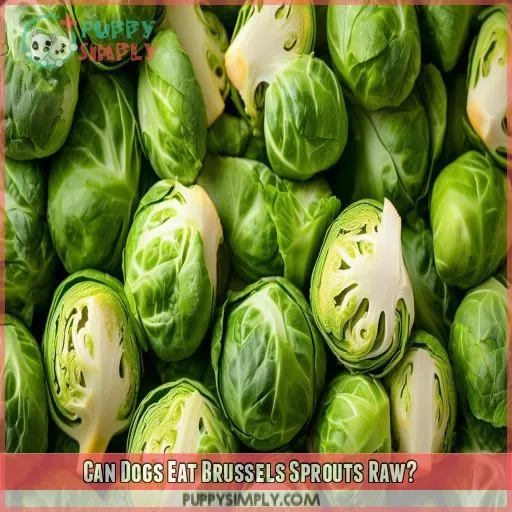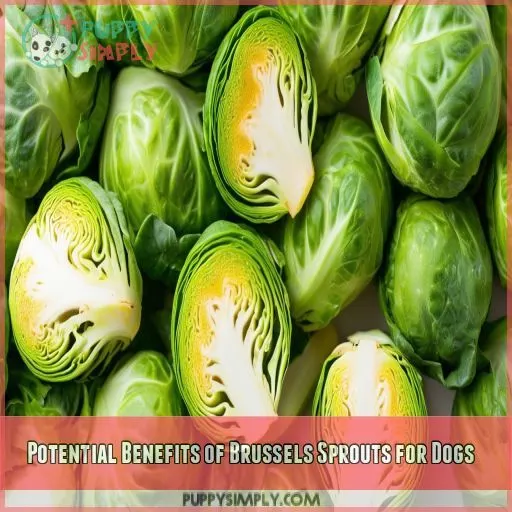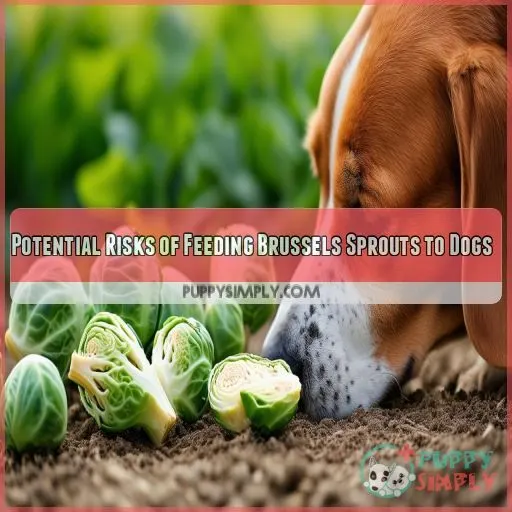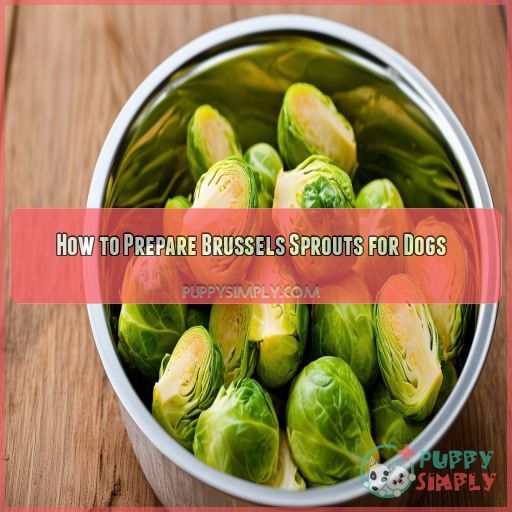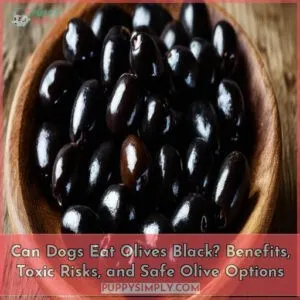This site is supported by our readers. We may earn a commission, at no cost to you, if you purchase through links.
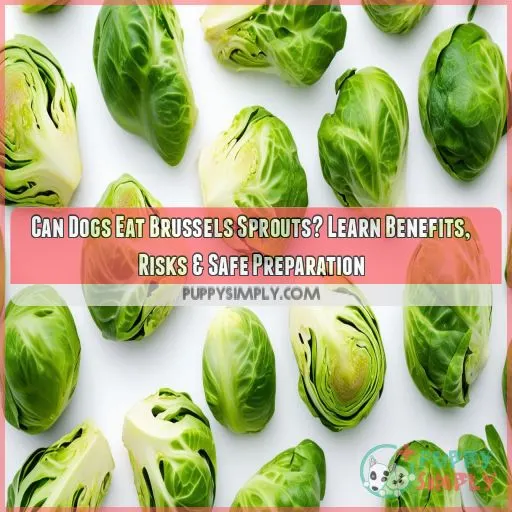 Imagine your four-legged buddy staring at those green balls on your plate. Can dogs eat Brussels sprouts? You’re right to be ultra-cautious. While these mini cabbages can bring potential health benefits, they also pose some risks.
Imagine your four-legged buddy staring at those green balls on your plate. Can dogs eat Brussels sprouts? You’re right to be ultra-cautious. While these mini cabbages can bring potential health benefits, they also pose some risks.
In this very detailed guide, learn the nutritional benefits, hazards, and safe preparation so you can feed Brussels sprouts to your dog. You will know how to introduce this veggie into your dog’s diet wisely for his safety and health.
Now, let’s dive into the dos and don’ts of sharing Brussels sprouts with your four-legged friend.
Table Of Contents
- Key Takeaways
- Can Dogs Eat Brussel Sprouts?
- Can Dogs Eat Brussels Sprouts Raw?
- Potential Benefits of Brussels Sprouts for Dogs
- Potential Risks of Feeding Brussels Sprouts to Dogs
- How to Prepare Brussels Sprouts for Dogs
- Can Dogs Eat Brussels Sprout Stalks?
- Introducing Brussels Sprouts to Your Dog’s Diet
- Frequently Asked Questions (FAQs)
- Why can’t dogs eat brussel sprouts?
- How much Brussels sprouts can a dog eat?
- Can dogs eat kale and brussel sprouts?
- Can dogs eat brussels sprout stalks?
- Can Brussels sprouts help with a dogs bad breath?
- Are frozen Brussels sprouts safe for dogs to eat?
- How often can I give my dog Brussels sprouts?
- Can Brussels sprouts cause allergies in dogs?
- Do Brussels sprouts affect a dogs urine color?
- Conclusion
Key Takeaways
- Brussels sprouts can be a nutritious treat for your pup, packed with vitamins and antioxidants that’ll make their tail wag. Just remember, moderation is the name of the game – too much of a good thing might leave Fido feeling like a deflating balloon!
- Cook those little green orbs before serving them up to your furry friend. Raw sprouts are about as appealing (and digestible) as a mouthful of marbles. Steam, boil, or nuke ’em to make them easier on your dog’s tummy.
- Size matters when it comes to Brussels sprouts for dogs. Chop ’em up into bite-sized pieces to avoid any choking hazards. After all, we want your pooch to be a happy camper, not a canine Heimlich maneuver candidate!
- Introduce Brussels sprouts to your dog’s diet more slowly than a sloth on vacation. Start with tiny portions and keep an eye out for any tummy troubles or gas that could clear a room. If all goes well, you can gradually increase the serving size.
Can Dogs Eat Brussel Sprouts?
Yes, dogs can eat Brussels sprouts, but with some important precautions. While these veggies offer nutritional benefits like fiber and antioxidants, they should always be cooked before serving to your furry friend. Raw Brussels sprouts are tough to digest and can cause stomach upset.
When preparing them, steam, boil, or microwave without any seasonings, and cut them into small, bite-sized pieces to prevent choking. Start with a small amount, like 1-2 sprouts for a medium-sized dog, and watch for any adverse reactions.
As with any new food, it’s best to consult your vet before making changes to your pup’s diet. There’s more to learn about safely incorporating Brussels sprouts into your dog’s meals.
Can Dogs Eat Brussels Sprouts Raw?
Feeding your dog raw Brussels sprouts isn’t recommended. Raw Brussels sprouts can be tough to digest, causing digestive upset, gas, and bloating. Additionally, raw sprouts pose a choking hazard, especially for puppies and small dogs.
Cooking Brussels sprouts helps break down fibers, making them easier on your dog’s stomach. Always wash and trim the sprouts before cooking. Steaming, boiling, or microwaving are safe methods.
If your dog has allergies, introduce Brussels sprouts gradually to monitor any adverse reactions. While they can be a healthy treat when prepared correctly, raw Brussels sprouts should be avoided to prevent potential health issues.
Always prioritize your dog’s safety and consult your vet if you’re unsure about introducing new foods.
Potential Benefits of Brussels Sprouts for Dogs
Brussels sprouts can provide a nutritional boost for your canine companion. The fiber content in these veggies can aid your dog’s digestion, while the antioxidants and anti-inflammatory properties may support their overall health.
Nutritional Benefits
Brussels sprouts provide numerous nutritional benefits for your dog. They’re rich in essential vitamins like K, C, and A, and packed with antioxidants that protect against free radicals. These veggies can improve your dog’s blood clotting and bone health, while also reducing inflammation. However, be mindful of possible gas production, stomach upset, and flatulence.
Fiber Content
Brussels sprouts are full of fiber, which aids digestion in your dog. They prevent constipation and soothe diarrhea. Small amounts will supplement their diet. While the amount of fiber is very beneficial, one has to be careful about noting the production of gas and other dietary reactions. Always introduce fiber gradually to minimize risks.
Immune System Support
Brussels sprouts are packed with vitamins and antioxidants that can give your dog’s immune system a boost. The vitamin C and K in these veggies support healthy blood clotting and bone development. Plus, the anti-inflammatory properties may help reduce swelling. Just be mindful of potential gas or digestive upset from the high fiber content.
Inflammation Reduction
Besides boosting the immune system, Brussels sprouts also boast anti-inflammatory properties. These nutrients help reduce inflammation in your dog’s body. Adding Brussels sprouts to their diet may aid in digestion and support gut health.
- Anti-inflammatory properties
- Gut health improvement
- Enhanced digestion
- Nutrient-rich benefits
Potential Risks of Feeding Brussels Sprouts to Dogs
Feeding Brussels sprouts to your dog carries potential risks such as digestive upset and choking hazards. Additionally, large quantities may interfere with thyroid function, so it’s important to monitor portions and consult your vet.
Digestive Upset
While Brussels sprouts provide valuable nutrients, they can also cause digestive upset in some dogs. The high fiber content may lead to excessive gas production, stomach upset, and flatulence. Diarrhea or vomiting may also occur if your pup eats too many. Start with small portions and monitor your dog’s reaction closely.
Choking Hazard
When feeding Brussels sprouts to your dog, remember they can be a choking hazard, especially the tough stalks. Always cut sprouts into small pieces to prevent this risk. Stalks, due to their fibrous nature, should also be chopped finely. By ensuring these precautions, you help keep your furry friend safe while enjoying this nutritious treat.
Thyroid Function
Large amounts of Brussels sprouts could affect your dog’s thyroid function because they contain a chemical called goitrogens, which impairs production of the thyroid hormones and can bring on hypothyroidism. Feeding in small amounts will usually not go wrong.
Always consult with your vet when adding new foods into their diet to ensure that your pup is getting what he needs for optimum health and well-being.
How to Prepare Brussels Sprouts for Dogs
When preparing Brussels sprouts for your dog, be sure to cook them thoroughly to soften the tough stalks and make them easier to digest. Serve the cooked sprouts in small, bite-sized pieces to prevent any choking hazards.
Safe Preparation Methods
First, for safety purposes, opt for fresh and firm Brussels sprouts. Clean it well, then remove the stems and cut them into bite portions to avoid choking. Sprouts that are well-cooked are easily digestible, maintaining their nutritional balance. This is better for your dog’s digestive health. Note that raw sprouts aren’t recommended due to specific digestive complications.
Cooking Techniques
You can cook Brussels sprouts for your dog in a few ways. The best way is steaming, since it retains the nutrients and only takes 5 minutes.
In a rush? Put them in the microwave for 8 minutes. You can boil them, too; that way just takes a little longer, about 10 minutes.
Whatever way you choose to cook them, don’t add any seasonings—they aren’t needed, and might even be bad for their health.
Serving Size Guidelines
Now that you know how to cook Brussels sprouts for your dog, let’s consider portion control. This is critical in terms of serving size to prevent digestive issues. Here are some guidelines to follow:
- Keep it small: feed 1-2 small sprouts for medium-sized dogs
- Observe reactions: Observe any adverse reactions.
- Increase as Tolerated: Gradually increase the dose if well-tolerated
- Limitation treatment: The intake of Brussels sprouts shouldn’t exceed 10% of the total daily calories.
Can Dogs Eat Brussels Sprout Stalks?
While Brussels sprout stalks aren’t toxic to dogs, they can be tough and fibrous, potentially causing digestive upset or choking. If you choose to feed your dog the stalks, make sure to cut them into small, manageable pieces and limit the amount given as part of a balanced diet.
Safety Concerns
Now that you know how to prepare Brussels sprouts for your furry friend, let’s address safety concerns about the stalks. While not toxic, Brussels sprout stalks can pose risks. Here’s a quick breakdown:
| Concern | Risk Level | Potential Issue |
|---|---|---|
| Flatulence | Moderate | Excessive gas |
| Digestion | High | Stomach upset, diarrhea |
| Choking | High | Obstruction |
| Fiber | Moderate | Digestive discomfort |
| Size | High | Swallowing difficulties |
Always prioritize your dog’s safety when introducing new foods.
Preparation Tips
While prepping Brussels sprout stalks for your dog, consider steaming methods for the best digestibility. Microwave cooking time will be about 5-7 minutes to get them tender.
Consider the portion recommendations—start small and increase as needed. While the stalk contains almost the same nutritional value that’s in the sprout head, it doesn’t digest as easily.
Monitor your dog for side effects like gas or bloating. Always put safety and comfort first with your pup when introducing new foods into their diet.
Serving Recommendations
When serving Brussels sprout stalks to your dog, remember that moderation is key. Treat these as occasional treats, not a staple.
Start with small serving sizes, about 1-2 tablespoons for medium-sized dogs. While stalks offer nutritional value, they can cause gas production if overfed.
Always monitor your pup’s reaction and adjust accordingly. Remember, even healthy treats should make up no more than 10% of your dog’s daily calorie intake.
Introducing Brussels Sprouts to Your Dog’s Diet
Introduce Brussels sprouts in small amounts and observe your dog for any sign of allergies or digestive upset. Give a very small amount—one-quarter to one-half of the sprout—and pay attention to what’s going on with your fur baby. Observe your pet for too much gas, which is quite common.
If everything turns out fine, then you can increase it gradually, but always following portion control. Don’t make your pup go from zero to Brussels sprout superhero in one night!
It’s always a good idea to consult with your vet before making extreme changes in your dog’s diet, especially if they have a history of allergies or sensitive stomachs. That way, you can safely see whether Brussels sprouts are a hit or miss with your furry friend.
Frequently Asked Questions (FAQs)
Why can’t dogs eat brussel sprouts?
Dogs can eat Brussels sprouts, but they shouldn’t have too many. They’re nutritious but can cause gas and digestive issues. You’ll want to cook them first, cut them into small pieces, and offer as an occasional treat.
How much Brussels sprouts can a dog eat?
Imagine your pup eyeing those leftover sprouts. You can safely offer small amounts, about 1-3 sprouts for medium-sized dogs. Start with half a sprout and gradually increase. Always cook them first and cut into bite-sized pieces to prevent choking.
Can dogs eat kale and brussel sprouts?
Yes, dogs can eat both kale and Brussels sprouts in moderation. They’re packed with nutrients, but introduce them slowly to avoid digestive issues. Always cook these veggies and cut them into small, manageable pieces for your pup.
Can dogs eat brussels sprout stalks?
While dogs can eat brussels sprout stalks, it’s best to avoid them. They’re tough and fibrous, posing a choking hazard. Stick to the leafy parts, cooked and cut into small pieces, for a safer treat.
Can Brussels sprouts help with a dogs bad breath?
Brussels sprouts may help freshen your dog’s breath due to their fiber content, which can aid digestion. However, they’re not a cure-all. For persistent bad breath, it’s best to consult your vet for underlying issues.
Are frozen Brussels sprouts safe for dogs to eat?
Frozen Brussels sprouts are far from ideal in your dog’s dinner. They’re hard and a potential choking hazard. Let them thaw, then cook well. This way, they’ll be safe and much easier to digest for your pup.
How often can I give my dog Brussels sprouts?
You can give your dog Brussels sprouts once or twice a week as a treat. Start with small portions and monitor for any digestive issues. Don’t exceed 10% of their daily calorie intake from treats, including Brussels sprouts.
Can Brussels sprouts cause allergies in dogs?
While it’s rare, dogs can develop allergies to Brussels sprouts. You’ll need to watch for signs like itching, swelling, or digestive upset. If you suspect an allergy, stop feeding them and consult your vet for guidance.
Do Brussels sprouts affect a dogs urine color?
Brussels sprouts won’t directly change your dog’s urine color. However, they’re packed with nutrients that can affect hydration and metabolism. If you notice any unusual changes, it’s best to consult your vet for personalized advice.
Conclusion
Like a double-edged sword, Brussels sprouts can offer both benefits and risks for your canine companion. When considering "can dogs eat Brussels sprouts," remember that moderation is key.
Properly prepared, these mini cabbages can provide nutritional benefits and support your dog’s health. However, be aware of potential digestive issues and choking hazards.

